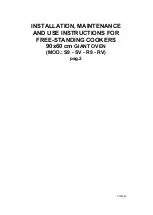
14
Care and Cleaning
Cleaning burner grates, caps, heads and glass cooktop
Cleaning the cooktop glass
Your appliance is shipped with the burner heads
and burner caps in the correct locations. Before
using your gas appliance be sure to:
● Follow installation instructions before operating.
● Remove all packing tape from cooktop area.
●
To avoid possible burns use care when
cleaning the cooktop.
DO NOT
attempt to clean
the cooktop whenever the cooktop or burner
heads are still hot.
●
To avoid possible burns
DO NOT
attempt any
of the following cleaning instructions provided
before turning OFF all of the surface burners
and allow them to cool.
●
To avoid possible burns
DO NOT
attempt to
operate the surface burners without the burner
caps.
Consistent and proper cleaning is essential to
maintaining your ceramic glass cooktop
Cleaning the burner Caps
Should you ever need to remove the burner caps
for cleaning lift the burner cap off the burner
head. Clean heavy soils with an absorbent cloth.
Rinse with a clean, damp cloth and immediately
thoroughly dry including the bottom and inside
of the cap. Do not use harsh abrasive cleaners.
They can scratch the porcelain on the cap. Do not
clean burner caps in dishwasher. When placing the
burner caps, see Important note below.
IMPORTANT
When placing the burner caps on the cooktop, be
sure the burner caps are seated firmly on top of
burner heads. Improper flame size and uneven
heating may result when any surface burners are
turned ON and the burner caps are not seated
correctly.
Cleaning the burner heads
Lift the burner cap from the burner head. The
surface burner heads are secured to the cooktop
and
must be cleaned in place.
For proper gas flow it may be necessary to clean
the burner heads and slots. To clean, first use a
clean DAMP cloth to soak up any spills. Remove
any food from between the burner slots using a
small nonabrasive brush like a toothbrush and
afterwards wipe using a damp cloth. For stubborn
soils located in the slots, use a small-gauge wire or
needle to clean.
Slots
Ignition port
Orifice port
Should you experience ignition problems it may be
that an ignition port hole is partially blocked with
soil (see figure below). With the burner head in
place, use a small wire gauge needle or the end of
a paper clip to clear the ignition port or ports.
Prior to using your cooktop for the first time, apply
a ceramic cooktop cleaning cream (available in
most hardware, grocery and department stores) to
the ceramic surface. Clean and buff with a clean
paper towel. This will make cleaning easier when
soiled from cooking. Cooktop cleaning creams
leave a protective finish on the glass to help
prevent scratches and abrasions.
Sliding aluminum or copper clad bottom pans on
the cooktop glass can cause metal markings on the
cooktop surface. These marks should be removed
immediately
after the cooktop has cooled using the
cooktop cleaning cream. Metal marks can become
permanent if not removed prior to future use.
Cookware (cast iron, metal, ceramic or glass) with
rough bottoms can mark or scratch the cooktop
surface.
Do not slide anything metal or glass
across the cooktop.
Do not
use your cooktop as a
cutting board or work surface in the kitchen.
Do not
cook foods directly on the cooktop surface without a
pan.
Do not
drop heavy or hard objects on the glass
cooktop, they may cause it to crack.




































